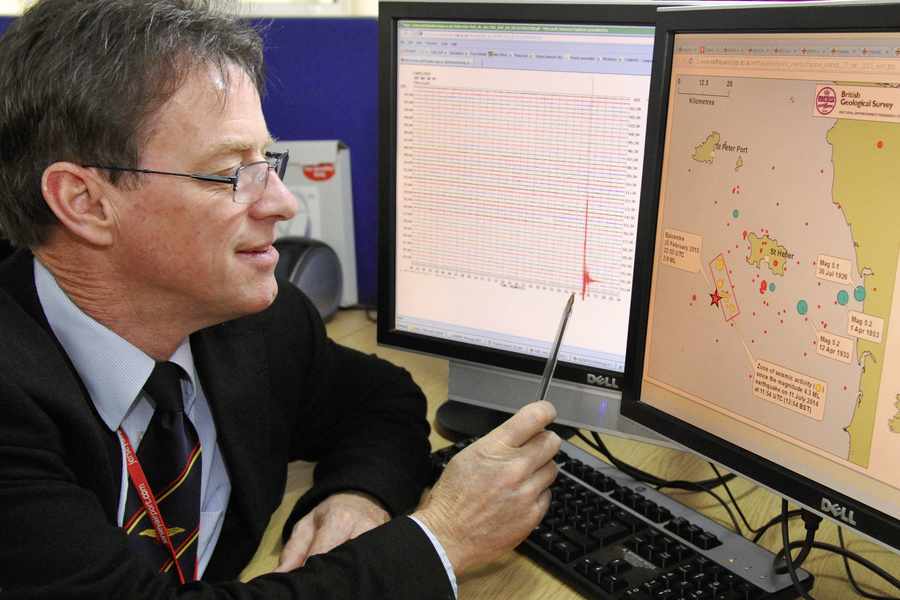- Seismologist answers our earthquake questions
- 3.7 magnitude earthquake hit Jersey on Wednesday
- See what Islanders who felt the tremor said about it
FROM toads going berserk and lightbulbs blowing to ornaments shaking and even people’s hair standing on end, Islanders across Jersey were swapping stories of the latest earthquake on Wednesday evening.

The quake, which was accompanied by a loud rumbling noise, was the latest tremor to strike in the Channel Islands area in the past year.
Its epicentre was about six kilometres south-west of Corbière.
But what exactly causes earthquakes near Jersey? And why have we experienced so many over the past couple of years?
Earthquake expert Julian Bukits, an assistant seismologist at the British Geological Society, answers the big questions on earthquakes:
What causes earthquakes in this area?
Although distant from the nearest plate boundary, which is the Mid-Atlantic Ridge, earthquakes occur when crustal stresses within the tectonic plates are relieved by movement occurring on pre-existing fault planes.
With regards to stress lines or geological faults, everywhere is criss-crossed with thousands of small geological faults where insignificant (by worldwide standards) earthquakes can occur. Britain has thousands, so it is difficult to pinpoint an earthquake to a particular fault. Unlike when a major world earthquake occurs, these are usually very close to the plate boundaries.
One way to imagine it is to think of an old china dinner plate. The glaze will be covered with hundreds of fine cracks (I think the arty term for that is crackle-glazed in furniture). None of these cracks is really detrimental to the use of the plate. However, if the dinner-plate has a major crack running across it, this is much more serious and it could break at any moment.
So countries such as Britain, France and Germany (termed ‘intraplate’), sit far from the tectonic plate boundaries where serious earthquakes occur. What we experience is akin to the crackle-glaze on the plate.

Why do some people feel them and some don’t?
It all depends on what activity a person is engaged in when an earthquake occurs.
Obviously if they are at rest, for example sitting in a chair watching TV or lying in bed reading a book, they are more likely to feel an earthquake than somebody who is on the move.
Could we ever get a tsunami here – even a small one?
No. The size of earthquakes that occur close to the Channel Islands cannot cause a tsunami.
A tsunami will only occur as a result of a bigger earthquake (bigger than magnitude 7) and they generally only happen close to the plate boundaries, and the Channel Islands are nowhere near that.
- The Island was hit by an earthquake measuring 5.2 in magnitude on 1 April 1853 and 12 April 1933. These are the largest earthquakes to have been recorded within a 50 km radius of Jersey.
- On 30 July 1926 the Island was hit by a 5.1-magnitude quake. Although relatively large for Britain, the quake was deep underground and little damage was caused.
- On 30 April 1990 a 3.5-magnitude quake started just south of St Aubins Bay and was felt across the Island. People reported houses shaking and heavy objects falling, although no structural damage occurred. The quake was also felt in Guernsey.
- Although relatively small, a 2.5 magnitude quake on 19 November 2002 was felt strongly by thousands of Islanders. The shaking lasted nearly a minute, but no damage was caused.
- A 1.8 magnitude earthquake struck on Boxing Day 2013, and again, no damage was caused.
- On 11 July last year thousands felt a 4.3-magnitudequake which was the 35th-largest ever recorded in the British Isles. It was followed by several other tremors during the following weeks.
Why do earthquakes make a noise?
The noise is caused by the sudden release of energy. Imagine the noise you make if you snap a twig, but on a much larger scale.
What is the likelihood of Jersey being hit by an earthquake causing serious damage?
The CI area has had larger earthquakes in the past, the latest being the 4.3 one on 11 July 2014, and further back a 5.1 in 1926 and two 5.2s in 1853 and 1933.
So it is not impossible that a larger earthquake than Wednesday’s event may occur, though it is not possible to predict when such an event may occur.
Are we more likely to get earthquakes at a certain time of the year?
No. They are not like the seasons and there is no strict pattern to their behaviour.
Why have we had a series of earthquakes in the past year or so, with not many in the years before?
That’s just the way of nature.
Following the 4.3 quake last year, the local geology is settling into a more comfortable position. With some earthquakes all the energy and movement and activity occur in one event, whereas in others, the activity can appear to continue for several months, or even years.
The British Geological Survey asks people who have felt earthquakes to share their experiences with it for research purposes. Here are what some Islanders who felt Wednesday’s tremor said:
- Loud noise. Sounded like a big lorry outside the house. It was very noticeable and the house started to shake, but it was over very quickly.
- It was quite mild. I thought it was my neighbours washing machine on the spin cycle.
- Cat sat up and looked around, now settled. Epicentre perhaps south from here.
- I had a sensation of my hair standing on end for at least half an hour after the quake.
- Toads outside my window started croaking loudly just before the quake. I thought it was strange as it is very early in the year to hear them.
- It sounded like a low-flying aircraft or a clap of thunder. I realised it wasnt thunder because I heard wine glasses in the kitchen rattling on the shelf, and the house shook a little. It lasted just few seconds.
- We have noticed new small cracks in our plaster over the last year, more so since the bigger quake.
- Its left me scared. Im a single mum of four children alone. Silly, I know, but Ive never experienced anything like it.
- Loudest Ive ever heard. Very different sound from previous experiences. Two-toned dom-dom leading up and increasing for about three to four seconds, then a bang followed by the dum-dum receding again for another three seconds.






